AFSCME Union Illegally Ordering Hospital Employee Fired
From The National Right to Work Legal Defense Foundation release: AFSCME Union Bosses Hit With Federal Charges for Illegally Ordering Hospital Employee Fired Union…
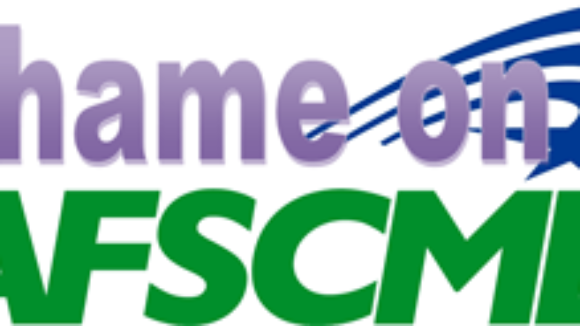
From The National Right to Work Legal Defense Foundation release: AFSCME Union Bosses Hit With Federal Charges for Illegally Ordering Hospital Employee Fired Union…
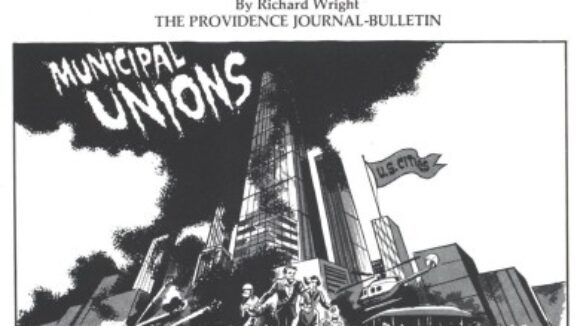
The Washington Post reports: The American Federation of State, County and Municipal Employees voted Tuesday to officially endorse President Obama in the 2012 election. Union officials have already said they planned to spend upwards of…
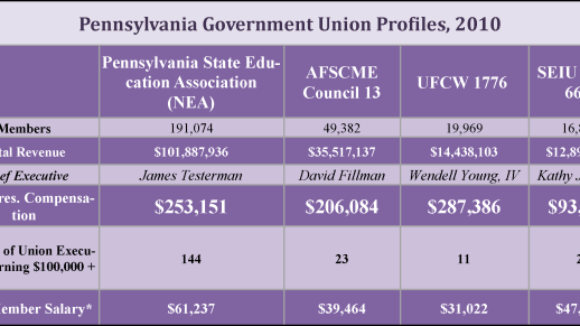
Forced-dues continue to fill the coffers of unions, as well as, union presidents' and politicians' pockets according to this recent study by the Commonwealth Foundation: Government Unions and Forced Dues Almost half of government workers in Pennsylvania are union members, compared to 9.3 percent in the private sector. Pennsylvania is a forced union state, meaning that workers can be forced to join a union or pay a [so-called] "fair share fee" just to keep their job. Most government units in Pennsylvania are "agency shops," with a specified union to which workers must pay a fee. When state and local governments automatically deduct dues and fair share fees from government workers' paychecks—as is the practice in Pennsylvania—employees have little or no say in how their money is used. Union Bosses Union bosses collect hefty salaries derived from member dues and fair share fees. In most cases, the salaries are several times the average union member's annual pay. While acknowledging that budgets were tight, AFSCME Council 13 President David Fillman got a 6 percent raise in 2010, making his salary higher than Gov. Tom Corbett's. Dues and fees often go towards expensive conferences, outings and junkets. For example, in 2009-10 the Pennsylvania State Education Association—the state's largest public sector union—spent: More than $250,000 on a board of directors retreat in Gettysburg. More than $89,000 for a "political institution meeting" at the Radisson Penn Harris in Camp Hill, Pa. $20,000 for advertising in the Pittsburgh Steelers Yearbook. Almost $5,900 at Kimberton Golf Club and more than $5,100 at Concord Country Club in Chadd's Ford. Political Activity and Lobbying

Forced-dues continue to fill the coffers of unions, as well as, union presidents' and politicians' pockets according to this recent study by the Commonwealth Foundation: Government Unions and Forced Dues Almost half of government workers in Pennsylvania are union members, compared to 9.3 percent in the private sector. Pennsylvania is a forced union state, meaning that workers can be forced to join a union or pay a [so-called] "fair share fee" just to keep their job. Most government units in Pennsylvania are "agency shops," with a specified union to which workers must pay a fee. When state and local governments automatically deduct dues and fair share fees from government workers' paychecks—as is the practice in Pennsylvania—employees have little or no say in how their money is used. Union Bosses Union bosses collect hefty salaries derived from member dues and fair share fees. In most cases, the salaries are several times the average union member's annual pay. While acknowledging that budgets were tight, AFSCME Council 13 President David Fillman got a 6 percent raise in 2010, making his salary higher than Gov. Tom Corbett's. Dues and fees often go towards expensive conferences, outings and junkets. For example, in 2009-10 the Pennsylvania State Education Association—the state's largest public sector union—spent: More than $250,000 on a board of directors retreat in Gettysburg. More than $89,000 for a "political institution meeting" at the Radisson Penn Harris in Camp Hill, Pa. $20,000 for advertising in the Pittsburgh Steelers Yearbook. Almost $5,900 at Kimberton Golf Club and more than $5,100 at Concord Country Club in Chadd's Ford. Political Activity and Lobbying
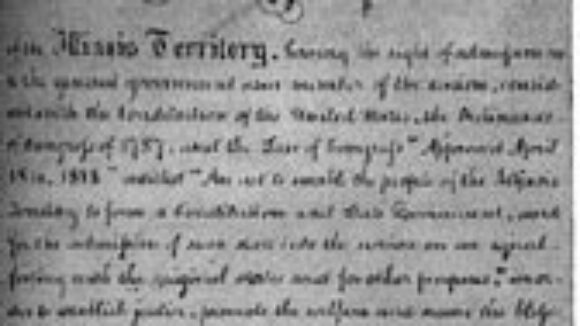
Big Labor union bosses in Illinois are fuming over a proposal that would require government workers to pay more toward their retirement. In fact, according to the head of the American Federation of State, County and Municipal Employees union,…
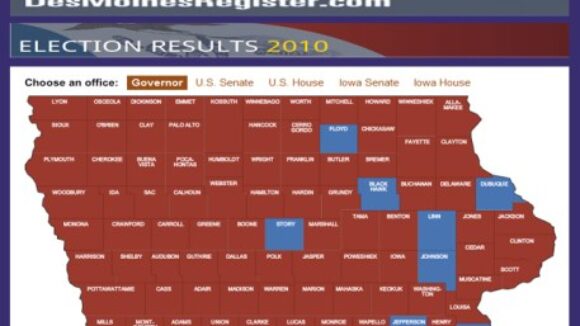
Right to Work Makes Major Gains in State Legislative Contests (Source: December 2010 NRTWC Newsletter) It takes a lot to convince Iowa citizens to oust a sitting governor. Until this fall, the last time a Hawkeye State chief executive failed to get another term after seeking one was in 1962! But over the past four years, Big Labor Democrat Gov. Chet Culver wore out Iowans' considerable patience. On November 2, he was one of 13 incumbent governors on the ballot across America. Eleven of these incumbents won, but Mr. Culver lost by a hefty 53% to 43% margin. What had Chet Culver done to receive such a harsh rebuke from normally amiable Midwesterners? He tried to gut Iowa's popular Right to Work law -- and he was sneaky about it. After saying nothing about the Right to Work issue during his successful 2006 gubernatorial campaign, Mr. Culver announced, almost as soon as the votes were counted, his support for legislation imposing forced union dues and fees on Iowa workers as a condition of employment. Since Mr. Culver's fellow Democrats controlled substantial majorities in both chambers of the Iowa Legislature that greeted him upon his inauguration in early 2007, it seemed Big Labor's stealthy scheme to bring back forced unionism to the state six decades after it had been banned would succeed. For four years, Gov. Culver tried to help union bosses extract forced fees from workers who choose not to join. But freedom-loving Iowans first thwarted him legislatively and then defeated him at the polls. But the National Right to Work Committee and the Iowans for Right to Work Committee were already mobilizing resistance. Pro-Right to Work Iowan Stopped Forced-Union-Fee Schemes in 2007 and 2009 Even before the new Legislature convened in January 2007, the National Committee began sending out a series of statewide and targeted mailings to members and supporters in Iowa, with a focus on selected House and Senate members in vulnerable seats.
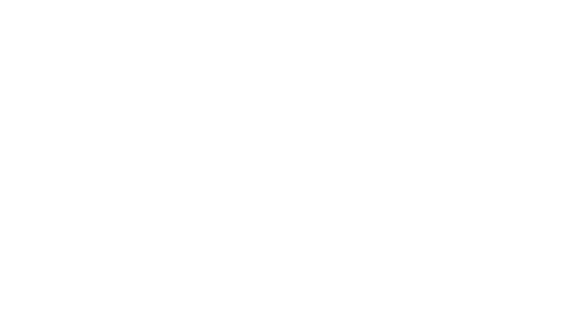
While the media is bashing outsider conservative groups and the Chamber of Commerce for spending on the elections, guess who are the real big spenders? Big Labor. The Wall Street Journal reports that while most attention has been…

While the media is bashing outsider conservative groups and the Chamber of Commerce for spending on the elections, guess who are the real big spenders? Big Labor. The Wall Street Journal reports that while most attention has been…
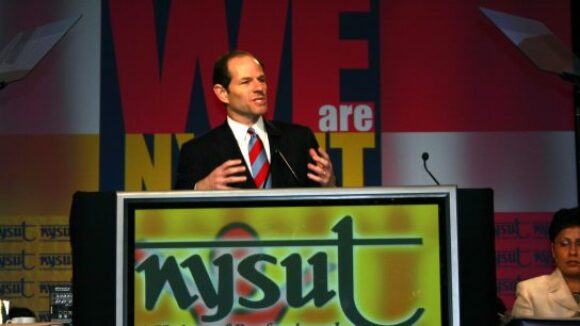
After bailouts and billions of dollars worth of taxpayer handouts, the big public employee union bosses are spending freely to keep the train rolling. From the Wall Street Journal: The National Education Association, the largest U.S. teachers union, has independently spent more than $3.4 million that must be disclosed, including ad buys and direct-mail campaigns, for the key electioneering period from Sept. 1 to Oct. 14. The NEA spent $444,000 during the same stretch in 2006. The American Federation of State, County and Municipal Employees has nearly matched its 2006 midterm outlays. It has spent $2.1 million on electioneering since the beginning of last month, according to FEC filings for two campaign committees associated with the union. That is just shy of the $2.2 million spent for that period in 2006. Unions that represent government workers say this year's election is crucial to them, given the uproar over public-sector budget issues. Officials elected this year will face tough choices on matters such as further fiscal assistance for the nation's cash-strapped states and local governments. The issue of campaign-related spending by public-sector unions has received more attention in recent years, as state and local governments struggle with pensions and other costs. Conservative critics and business leaders have said the unions largely seek to expand their influence at taxpayers' expense. Some states have approved restrictions on political use of union dues, for example requiring unions to obtain permission from workers before spending dues on campaigns.